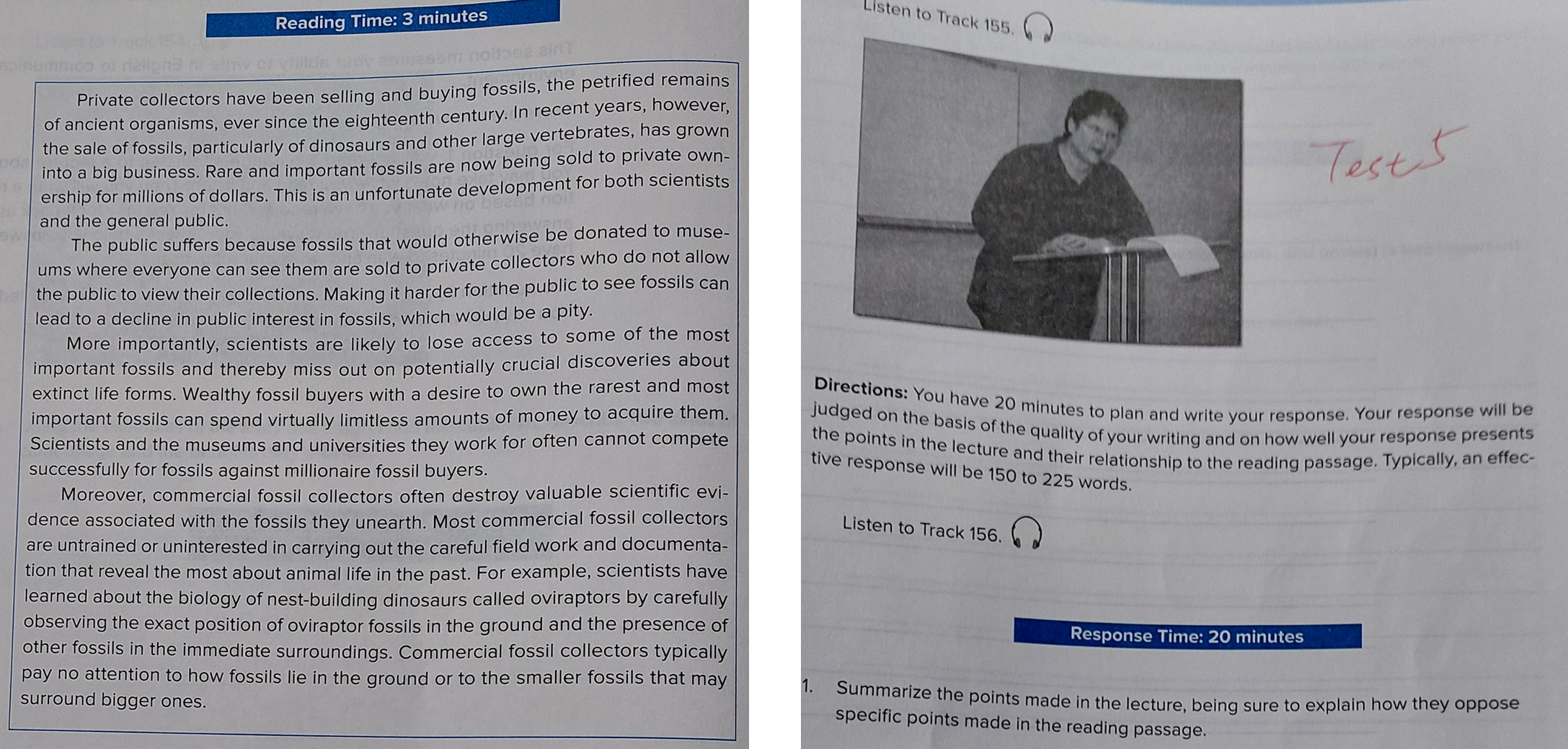Topic
Private fossil collection activity
Instruction

Content
The author of the passage posits that private fossil collection activity is bad for scholars and publics, while the lecturer presents a contrasting view, asserting that the pros of private fossil collection activity outweigh its cons.
First, the author claims that once the fossils been private properties, they will no longer open to public, and the people will lose their chance to visit it in the museum and learn about it. However, the lecturer states that the commercial fossil trade makes some public institutions, such as school and museum, be able to purchase the fossil and then display to the public, therefore the commercial fossil trade will actually increase the exposure of fossils to the public.
Second, the author points out that the scholars will lose their resource of research, as the scholars’ wealth can’t be more than the private collectors, and most of the fossil found are likely to be owned by private collector unevenly. The lecturer contradicts this idea by emphasizing that the fossils will undergo many examinations conducts by scientist and experts before the trade, and thus, the scholar community will not lose any research opportunity.
Finally, the author argues that the private collectors may ruin these treasures because they don’t value the fossils so much. During the digging process, the hidden fossils underground or nearby may be ignored and damaged probably. The lecturer claims that the value of location information provided by private collectors makes the situation better than the fossil remained undiscovered.
In conclusion, the author doesn’t agree on the private fossil collect activity based on the reasons, such as the public and scientist community may lose the opportunity to visit and research and the hidden fossils surrounded may be damaged. The lecturer disputes the author by stating that educational institutions can purchase the fossil through fossil trade and increase the exposure of fossil. Also, the scientist won’t lose any opportunity to research through regular examinations, furthermore, they may benefit from the location information of fossil provided by private collectors.
Revision
The author of the passage posits that private fossil collection activity is detrimental to scholars and the public, while the lecturer presents a contrasting view, asserting that the pros of private fossil collection activity outweigh its cons.
Firstly, the author claims that once the fossils become private properties, they will no longer be open to the public, and people will lose their chance to visit them in museums and learn about them. However, the lecturer states that the commercial fossil trade enables public institutions, such as schools and museums, to purchase fossils and then display them to the public. Therefore, the commercial fossil trade will actually increase the exposure of fossils to the public.
Secondly, the author points out that scholars will lose their research resources, as scholars’ wealth can’t surpass that of private collectors, and most of the fossils found are likely to be owned by private collectors unevenly. The lecturer contradicts this idea by emphasizing that fossils undergo many examinations conducted by scientists and experts before the trade. Thus, the scholarly community will not lose any research opportunities.
Finally, the author argues that private collectors may ruin these treasures because they don’t value the fossils as much. During the digging process, the hidden fossils underground or nearby may be ignored and damaged. The lecturer claims that the value of location information provided by private collectors makes the situation better than if the fossils remained undiscovered.
In conclusion, the author doesn't agree with private fossil collection activity based on reasons such as the public and scientific community losing the opportunity to visit and research, and the potential damage to hidden fossils. The lecturer disputes the author by stating that educational institutions can purchase fossils through fossil trade, increasing the exposure of fossils. Moreover, scientists won’t lose any opportunities for research through regular examinations; furthermore, they may benefit from the location information of fossils provided by private collectors.